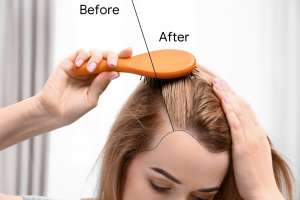Share This Article
When recovering from the Coronavirus (COVID-19) infection, did you realize a seeming increase in hair loss? It could lead to long-term effects, if not treated in time. If you have been experiencing excessive hair loss recently and are wondering what to do about it, read on to find out its causes.
Causes for hair loss
Temporary hair loss after a severe illness or the stress associated with it is normal. Acute stress disrupts the hair regrowth cycle because your body’s energy prioritizes life-sustaining functions over hair regrowth. Consequently, your hair goes into the resting phase of the hair regrowth cycle early and then falls out. It might eventually lead to thinning hair and bald patches on the scalp. Here are the top three causes for severe hair loss during or post-COVID-19.
- Stress: Physical and emotional stress post COVID-19 might lead to a hair loss condition known as telogen effluvium. It causes hair follicles to become loose and eventually fall out. This hair loss is noticeable while brushing or washing your hair.
- Nutritional deficiencies: Nutritional deficiencies experienced during or after COVID-19 can lead to hair loss. Iron, zinc and vitamin deficiencies in the food are well-known causes for excessive hair loss.
- Post-viral inflammation: Many patients recovering from COVID-19 experience excessive hair loss 2-3 months after the viral infection. It is common in the COVID-19 recovery process. After an average of around 55 days post-recovery, noticeable hair loss (Source: Deccan Herald) It happens as up to 50% of the hair moves into the resting or dormant phase of the hair regrowth cycle. The post-viral inflammatory response of the body might last about three months, after which hair regrowth returns to normal.

How to cope up with coronavirus anxiety and avoid hair loss?
The first step is to identify the exact cause of hair loss by consulting a doctor. He or she will find out if the hair loss is due to COVID-19, nutritional deficiencies, hormonal imbalances, scalp problems or other underlying diseases. The good news is that if the primary trigger of your hair loss is COVID-19, it is temporary and will resolve itself. As soon as your body starts to get well, the hair regrowth cycle will also get back to normal. It might take around 6-9 months for the next hair regrowth cycle to start and return to the growth phase. Here are a few tips to avoid and prevent further hair loss.
- Destress
Understand that the hair loss is reversible. Emotional and physical stress often aggravates the hair loss condition, so it is essential to de-stress. Practice some calming techniques to manage stress such as meditation and yoga. The telogen effluvium-related hair loss typically resolves on its own without any intervention.
- Maintain a nutrient-rich diet plan
A nutrient-rich diet plan makes sure that your body gets proper nutrition post-COVID-19 recovery. Take adequate amounts of vitamin D, iron and other minerals to promote hair regrowth.
- Increase protein intake
While recovering from COVID-19, follow a balanced diet with enough protein intake. Include food like eggs, chicken, soybean, paneer, seafood, milk, cheese, etc. The Coronavirus attacks the immune system. As it’s a battle that happens over weeks, you require huge amounts of protein to rebuild your white blood cells. Also, there is a lot of muscle tissue damage because the body turns towards the muscles to provide these necessary proteins. To combat COVID-19, the immune system sends emergency signals to the entire body saying don’t focus on the synthesis of hair because it can be compromised while you are saving the body. Hence, this results in hair loss during this period. To combat this, increase your protein intake to 1.5 g per kg of body weight.
- Focus on gut health
Focus on a healthy digestive system. Add prebiotic foods such as garlic, onion, banana. Also, add probiotic foods such as curd and yogurt. Don’t forget to increase hydration. This aids the nutrients’ absorption in your body. This, in turn, will prevent hair loss and promote new hair regrowth.
- Don’t smoke
Avoid smoking as it puts additional stress on your body which might increase the hair loss.
- Get proper sleep
Optimum sleep ensures that your body undergoes proper protein synthesis and releases the hormones required for good hair regrowth.
- Pursue hair loss treatment
With numerous hair loss remedies that promise hair regrowth, it’s important to choose the one that works best for you. An effective hair loss treatment requires a personalized approach. The homeopathic treatment is chosen based on the hair loss causes, the extent of hair loss, the grade of baldness, and the scalp condition. If you have severe hair loss, it is best to consult an experienced homeopathic doctor for a customized hair loss treatment. At OHO Homeopathy, we provide effective hair loss remedies. We have successfully treated more than 1 lakh patients.
COVID-19 has emerged as a significant cause of hair loss in many patients. It is normal to experience a mild to moderate amount of hair loss after COVID-19. It is ideal to seek medical help from an expert homeopathic doctor for the most suitable treatment plan. Book an online appointment with us for side-effect-free homeopathic treatment.

